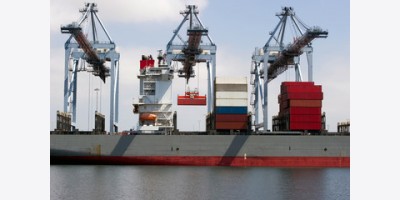A tanker is docked at the Flint Hills refinery in Corpus Christi, Texas, on Oct. 4, 2012.
When Big Oil began preparing last year to challenge the decades-old rules against exporting U.S. crude, the debate seemed fanciful. Then Russia took over Crimea and the idea of using American energy -- oil as well as natural gas -- to reshape global affairs became a Washington pet project.
Here’s how the battle lines are drawn: Oil producers want to chase higher prices overseas. Refiners want to keep cheaper domestic supplies. Politicians want to balance those interests with concerns that gasoline prices would rise. Everyone invokes the goal of energy independence.
Putting the posturing aside, it’s useful to imagine what actually happens to supply, demand and prices in an oil market without the export restrictions that date to the 1970s Arab oil embargo. That’s what JBC Energy GmbH, a Vienna-based research company, offered in a report this week.
The upshot? Producers win, refiners lose, global prices converge -- and the question of energy independence, is, well, irrelevant.
Lifting the ban would increase U.S. crude-oil production by about 700,000 barrels a day, raise exports by about 1.5 million barrels a day and push up imports by about 500,000 barrels a day by 2020, JBC estimates. So the net effect on the country’s energy balance sheet is pretty negligible. Global supply wouldn’t change much either, as other producers would adjust, according to JBC.
WTI-Brent Spread
Prices, however, would be transformed. West Texas Intermediate, the benchmark U.S. grade, has been cheaper than Brent, its international counterpart, since 2010 as a surplus of domestic crude developed. Even as the U.S. still imports more than 7 million barrels a day, it has too much domestic crude because the refining system wasn’t designed for the type of oil produced from hydraulic fracturing in shale formations.
Right now that oil has nowhere to go, which is why domestic prices are lower. As the glut escalates, at some point the U.S. has to curtail production, expand refineries or allow exports. If it’s the latter, the gap between WTI and Brent would narrow to as little as $1 a barrel, compared with $5.55 today, according to JBC.
European refiners that would buy the cargoes would benefit, while U.S. plants would lose much of their advantage and reduce runs, JBC estimates. That means U.S. exports of refined fuels, which are permitted and are currently at record levels, would shrink. Gasoline prices wouldn’t change much because they depend on global trade, according to JBC.
So is JBC’s analysis an argument for or against crude exports? Both sides can probably claim victory.
The one thing it doesn’t support is the idea that allowing U.S. oil exports would redefine global markets or geopolitics. So the debate, in the end, boils down to one thing: different parts of the oil industry competing for profits.
By Bloomberg
























